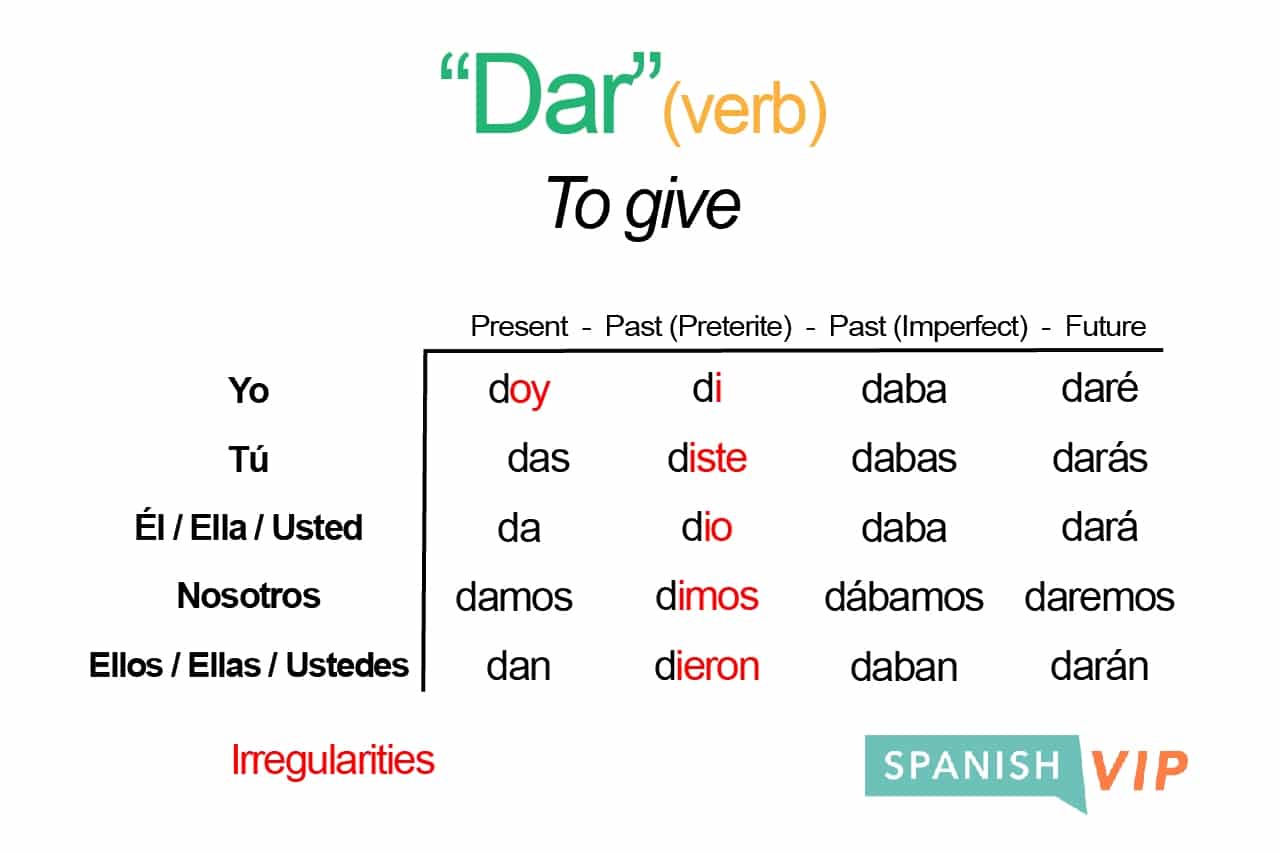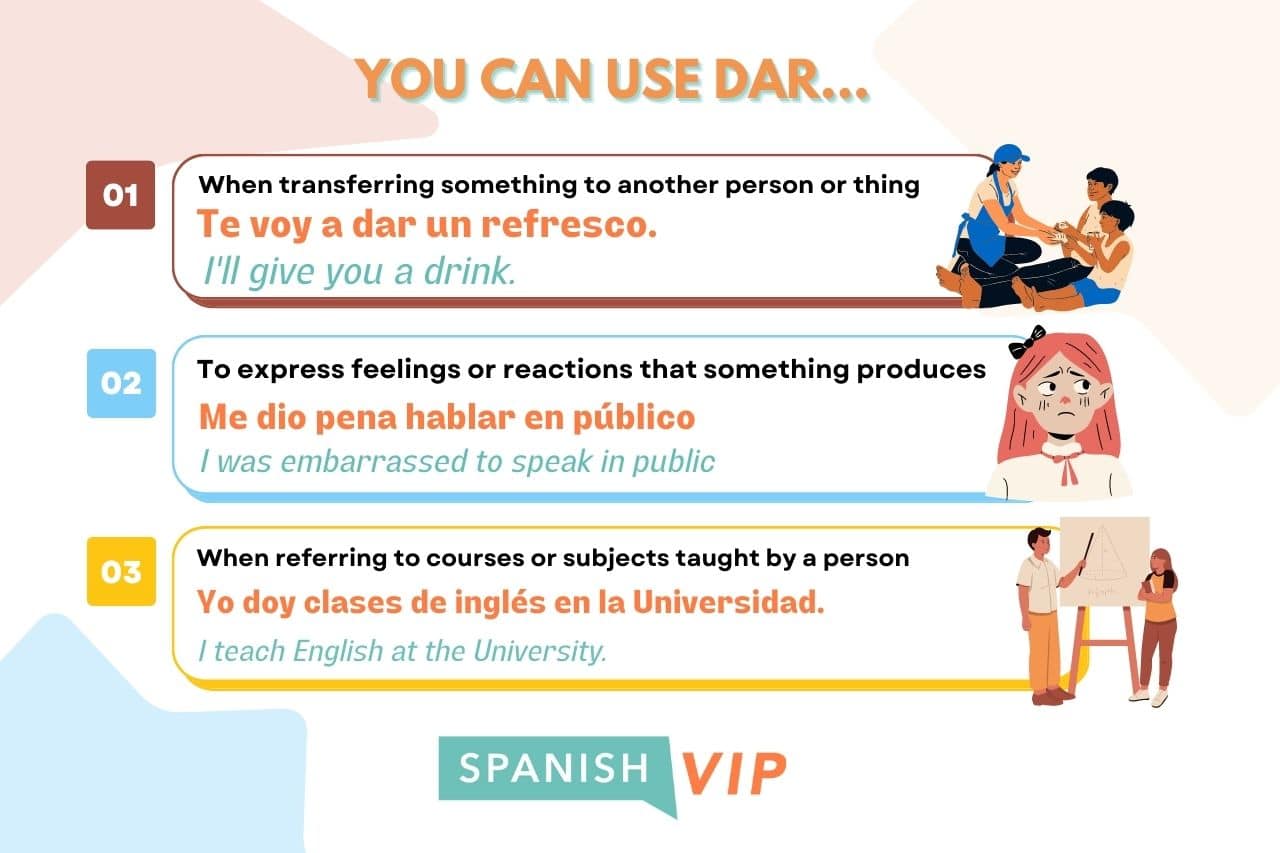The verb “Dar” is a very common and important verb in the Spanish language, and understanding how to conjugate it correctly is essential if you want to express a desire to give something to someone, lucky for you, it doesn’t have that many irregularities in its conjugation, so you can learn it very easily.
Irregular verbs can be difficult to use correctly in Spanish, and it’s important to learn how to conjugate them to avoid making mistakes in your speaking and writing.
There are many irregular verbs in Spanish that don’t follow the same conjugation patterns as regular verbs, and the only way to know how to use them properly is to learn the specific conjugations for each one by putting them into practice in different tenses and moods.
The more verbs you know and can conjugate correctly, the more confident and proficient you will be in using the language!
In this article, we will be looking at another very important Spanish verb conjugation used to give things, so pay close attention because we’re going to see all about “dar” conjugation! Get ready, let’s conjugate “dar.”

What is the Spanish verb dar?
The Spanish verb dar is the equivalent of “to give” in English. It is an irregular verb, and it is used to express the idea of giving, transferring, granting, passing, or awarding something to someone.
Depending on the context, dar could have different meanings in Spanish. Below are some of the situations where you can use dar along with their corresponding English translation.
Since it’s the direct translation of “to give”, dar is commonly used to express that a person is passing, giving, or transferring something to someone else
- ¿Podrías por favor darme un refresco? – Could you please give me a soda?
Dar can also refer to the courses or subjects that someone (a teacher, a tutor, a mentor, etc.) teaches.
- Yo daba clases de inglés en la Universidad. – I taught English at the University.
As well as to describe the feelings or reactions that something produces.
- Me dio mucha pena hablar en público. – I was very embarrassed to speak in public.

Dar conjugation: let’s learn all the secrets of this Spanish verb
In most Spanish tenses, dar is an irregular verb, which means that its conjugation changes depending on the tense being used. However, dar is not irregular in the imperfect, future, and conditional tenses.
To help you understand how to conjugate “dar” in the basic tense, here is a chart that shows the conjugation of the verb “dar” in the present indicative tense.
| Pronouns | “Dar” present tense conjugation | English Equivalent |
| Yo | Doy | I Give |
| Tú | Das | You Give |
| Ella / Él / Usted | Da | He / She Gives |
| Nosotras / Nosotros | Damos | We Give |
| Vosotras / Vosotros | Dais | You Give |
| Ellas / Ellos / Ustedes | Dan | They Give |
Dar conjugation in the Indicative mood
It’s the most common and widely used mood in Spanish. It is used to describe actions, events, and states that are considered facts. It is important to learn the indicative because it’s a fundamental part of Spanish grammar.
| Subject | Present | Preterite | Imperfect | Future | Conditional |
| Yo | doy | di | daba | daré | daría |
| Tú | das | diste | dabas | darás | darías |
| Él, Ella, Usted | da | dio | daba | dará | daría |
| Nosotros | damos | dimos | dábamos | daremos | daríamos |
| Vosotras, Vosotros | dais | disteis | dabais | daréis | daríais |
| Ellos, Ellas, Ustedes | dan | dieron | daban | darán | darían |
Examples of Dar in the basic mood
Present tense
- Yo siempre doy mi libro a mi amigo. – I always give my book to my friend.
Preterite tense
- ¿Le diste tu numero a tu compañero? – Did you give your number to your classmate?
Imperfect tense
- Yo daba lecciones de piano todos los días. – I used to give piano lessons every day.
Future tense
- Nosotros daremos nuestras mochilas a los niños necesitados. – We will give our backpacks to needy children.
Conditional tense
- Si tuviéramos más dinero, daríamos algunos regalos a los ancianos del hogar de ancianos. – “If we had more money, they would give some gifts to the elderly in the nursing home.”
Dar conjugation in the compound indicative mood
Spanish has an extended range of more complex tenses called Compound tenses, which use two verbs instead of just one to convey more meaning.
The main verb in these tenses is “haber” which means “to have” and it acts as an auxiliary verb to add clarity and precision to sentences about time and the order of events.
| Subject | Present Perfect Tense | Pluperfect Tense
(Past Perfect) |
Future Perfect Tense | Conditional Perfect Tense |
| Yo | He dado | Había dado | Habré dado | Habría dado |
| Tú | Has dado | Habías dado | Habrás dado | Habrías dado |
| Él, Ella, Usted | Ha dado | Había dado | Habrá dado | Habría dado |
| Nosotros | Hemos dado | Habíamos dado | Habremos dado | Habríamos dado |
| Vosotras, Vosotros | Habéis dado | Habíais dado | Habréis dado | Habríais dado |
| Ellos, Ellas, Ustedes | Han dado | Habían dado | Habrán dado | Habrían dado |
Examples of dar in the compound mood
Present perfect tense
- He dado clases de español durante años. – I have taught Spanish for years.
Pluperfect tense (past perfect)
- Ya nosotros le habíamos dado las entradas al señor cuando subimos al tren – We had already given the tickets to the man when we got on the train.
Future Perfect tense
- Le habré dado un regalo a mi amigo para su cumpleaños. – I will have given my friend a present for his birthday.
Conditional perfect tense
- Le habríamos dado nuestras mochilas a los niños necesitados si tuviéramos más dinero. – We would have given our backpacks to needy children if we had more money.
Dar conjugation in the Subjunctive Mood
It’s one of the three moods we use in Spanish (along with the indicative and imperative moods). It’s a great way to express uncertainty or doubt about something.
| Subject | Present | Imperfect 1 | Imperfect 2 | Future |
| Yo | dé | diera | diese | diere |
| Tú | des | dieras | dieses | dieres |
| Él, Ella, Usted | dé | diera | diese | diere |
| Nosotros | demos | diéramos | diésemos | diéremos |
| Vosotras, Vosotros | deis | dierais | dieseis | diereis |
| Ellos, Ellas, Ustedes | des | dieran | diesen | dieren |
Examples of dar in subjunctive
Present Subjunctive
- Ojalá que mi regalo te dé mucha alegría. – I hope that my gift gives you a lot of joy.
Imperfect Subjunctive
- Si tuviera más tiempo, le diera clases de piano a los niños de la comunidad. – If I had more time, I would give piano lessons to the children in the community.
Future Subjunctive
- Espero que ellos dieren una respuesta positiva a mi solicitud de trabajo. – I hope they give a positive response to my job application.
Dar conjugation in the compound subjunctive mood
In Spanish, the subjunctive is used in two compound tenses: the present perfect tense subjunctive (pretérito perfecto) and the past perfect tense subjunctive. There is also a Spanish future perfect tense in the subjunctive (futuro perfecto), but it is no longer used.
It is important to note that there are two sets of conjugations for the Pluperfect, both of them work in the same way and can be used interchangeably.
| Subject | Present Perfect Tense | Pluperfect Subjunctive 1 | Pluperfect Subjunctive 2 |
| Yo | Haya dado | Hubiera dado | Hubiese dado |
| Tú | Hayas dado | Hubieras dado | Hubieses dado |
| Él, Ella, Usted | Haya dado | Hubiera dado | Hubiese dado |
| Nosotros | Hayamos dado | Hubiéramos dado | Hubiésemos dado |
| Vosotras, Vosotros | Hayáis dado | Hubierais dado | Hubieseis dado |
| Ellos, Ellas, Ustedes | Hayan dado | Hubieran dado | Hubiesen dado |
Examples of verb dar in the compound subjunctive
Present Perfect Subjunctive
- Espero que hayas dado las gracias al anfitrión por la comida tan deliciosa. – I hope that you have thanked the host for the delicious food.
Pluperfect Subjunctive
- No sé si el hubiera dado tu libro a tu amigo si te lo hubieran pedido. – I don’t know if he would have given your book to your friend if they had asked you to.
- No sé si hubiésemos dado nuestras mochilas a los niños necesitados si tuviéramos más dinero. – I don’t know if we would have given our backpacks to needy children if we had more money.
Dar conjugation in the imperative mood
The imperative mood is used to give orders or commands, which can be either positive or negative. It is not possible to use the imperative mood when giving orders to yourself or a third person (Él, Ella, Ellos, Ellas), so these subjects are not used in this mood.
| Subject | Affirmative | Negative |
| Tú | ¡da! | ¡No des! |
| Usted | ¡dé! | ¡No dé! |
| Nosotros | ¡demos! | ¡No demos! |
| Vosotras, Vosotros | ¡dad! | ¡No deis! |
| Ustedes | ¡den! | ¡No den! |
Examples of dar in the imperative mood
Affirmative Imperative
- ¡Da tu libro a tu amigo! – Give your book to your friend!
Negative Imperative
- ¡No den sus mochilas a los niños necesitados sin la autorización de sus padres! – Don’t give your backpacks to needy children without their parents’ permission!
Spanish Phrases and Expressions Using the Verb Dar
Dar por vencido
Essentially, darse por vencido is a way to describe the act of giving up or quitting.
- ¡No te des por vencido! ¡Ya casi terminas! – Do not give up! You’re almost there!
Darse cuenta
means “to realize something”.
- ¡No me di cuenta que era tan tarde! – I didn’t realize it was so late!
Dar con algo (o alguien)
It is often used when you find something by chance.
- Di con un billete de diez dólares en el suelo. – I found a ten-dollar bill on the floor.
Dar luz, dar a luz
Use the expression “dar a luz” the same way you would refer to “to give birth.”
- Mi esposa dio a luz a una hermosa niña – My wife gave birth to a beautiful girl.
Dar lo mismo da igual
It’s an expression that means “not to matter” or “to make no difference”.
- Me da lo mismo si vienes o no. – I don’t care if you come or not.
Dar las gracias
“Dar las gracias” is a Spanish phrase that literally means “to give thanks”. It is a common way to express gratitude or thankfulness.
- Quiero darte las gracias por rescatarme. – I want to thank you for rescuing me.
Dale, no pares
In conclusion, the Spanish verb dar is an important verb to learn and master when learning Spanish. It has many different irregularities in its conjugation, it is crucial to understand and practice the Spanish verb conjugations of this irregular verb in order to communicate effectively in Spanish.
By practicing and familiarizing yourself with the different conjugations of “dar” you will be able to communicate more accurately and effectively in Spanish, and you will be well on your way to becoming a proficient speaker of the language.
Improve your Spanish skills and reach fluency with the help of SpanishVIP! Our expert instructors will guide you through the complexities of irregular verbs so you can conjugate dar and other essential verbs.
Take advantage of our complimentary free 1:1 trial class or our 7-day free group classes trial. Let us assist you on your path to Spanish proficiency!
Want to learn Spanish, fast?
Download our e-book, Easy Spanish Shortcuts, and learn your first 1,000 Spanish words in under a day!




